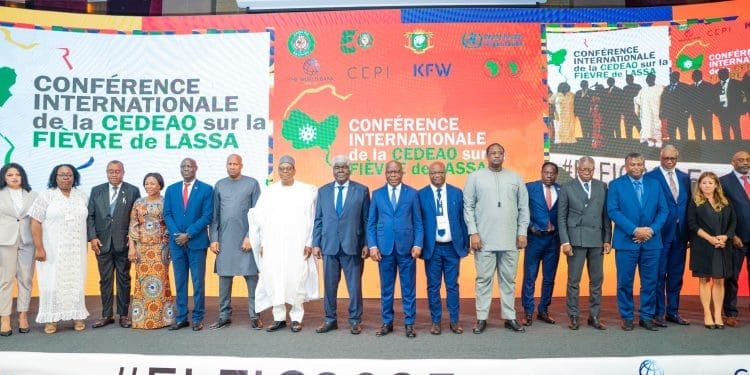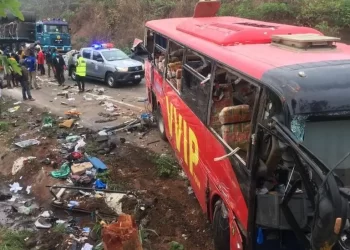The second phase of large-scale epidemiological studies on Lassa fever is currently underway across three West African countries as part of a bold regional push to better understand and combat the deadly viral disease.
Nigeria, Sierra Leone, and Liberia are taking part in the studies called Enable 1.5, which have enrolled some 5,000 participants in total.
The studies, which started in 2024 and are currently ongoing, seek to map the spread, prevalence, and clinical impact of Lassa fever across diverse environments in the sub-region, where the disease has remained a recurring health threat for decades.
The announcement was made in Abidjan, Côte d’Ivoire, by Dr. Henshaw Mandi, a consultant to the Coalition for Epidemic Preparedness Innovations (CEPI), during the opening of the 2nd ECOWAS Lassa Fever International Conference (ELFIC 2025).
He noted that the initial phase, titled Enable 1.0, involving 23,000 participants, was carried out in five countries—Nigeria, Benin, Sierra Leone, Liberia, and Guinea Conakry. This study started in 2020 and ended in 2023.
Dr. Mandi stressed that the epidemiological studies are critical in shaping strategies for vaccine development and public health interventions.
Phase 2 vaccine trials
In addition to the epidemiological studies, Dr. Mandi disclosed that phase 2a clinical trials for a Lassa fever vaccine are already underway in Ghana, Nigeria, and Liberia. These involve a smaller sample of 612 participants across the three countries combined.
According to him, earlier vaccine studies had been carried out in the United States and Liberia. The phase 1a trials took place in 2023 in both the U.S. and Liberia, while phase 1b trials were conducted solely in Liberia.
“The vaccine development process is rigorous. Following the completion of the current phase 2a trials, we expect to move to phase 2b and then to phase 3 before arriving at an eventual vaccine,” Dr. Mandi explained.
Building regional capacity for vaccine manufacturing
One of the major challenges for Africa during global health emergencies has been timely access to vaccines.
Dr. Mandi stressed that CEPI, which is funding the trials, and its partners are determined to avoid a repeat of the inequities seen during the COVID-19 pandemic.
To this end, he revealed that a Regionalised Vaccine Manufacturing Collaborative has been established to ensure production capacity exists within West Africa.
Although no specific country has yet been selected to lead the manufacturing efforts, Senegal was mentioned as one of the countries with proven capacity and experience to support vaccine production.
Lassa fever’s toll on health and communities
Lassa fever, a viral haemorrhagic disease endemic in parts of West Africa, continues to devastate lives and communities. One in five infections leads to severe disease, with the virus attacking vital organs such as the liver, spleen, and kidneys.
The consequences are not limited to the health sector alone. For rural and underserved communities—where early diagnosis and treatment are often out of reach—the disease brings widespread social and economic disruption.
Farmers lose productivity, households face crippling medical costs, and fragile health systems struggle to cope with outbreaks that flare up year after year.
Despite its deadly impact, no approved vaccine or antiviral drug currently exists for Lassa fever. This reality underscores the urgency of both the epidemiological and vaccine trials currently underway.
Abidjan hosts landmark regional conference
The ELFIC 2025 conference in Abidjan has drawn together scientists, policymakers, and development partners to advance the fight against Lassa fever.
Organised by the West African Health Organisation (WAHO) in collaboration with CEPI and international partners, the four-day meeting has been described as the most important global forum dedicated to addressing the disease.
Taking place under the theme “Beyond Borders: Strengthening Regional Cooperation to Combat Lassa and Emerging Infectious Diseases”, the conference serves as a platform for knowledge exchange and collaboration across disciplines and borders.
The programme features keynote speeches, ministerial roundtables, high-level panel discussions, and technical workshops. Participants are examining advances in vaccine and diagnostic development, outbreak surveillance systems, community engagement strategies, and sustainable policy frameworks for disease control.
Innovation, partnerships, and global support
Alongside the plenary and technical sessions, ELFIC 2025 is showcasing innovations from research institutions, non-governmental organisations, and private sector partners.
Exhibitions and networking sessions are designed to foster stronger collaborations, ensuring that scientific discoveries translate into concrete public health actions.
The conference has attracted high-level participation from ECOWAS member states as well as global institutions including the World Health Organization (WHO), the World Bank, the African Development Bank (AfDB), CEPI, and German development bank KfW.
Their presence signals not only strong political commitment but also the mobilisation of financial and technical resources needed to sustain long-term interventions against Lassa fever and other emerging infectious diseases.
A turning point in the fight against lassa fever
With West Africa still grappling with recurring outbreaks, the simultaneous launch of epidemiological studies and vaccine trials represents a turning point in efforts to defeat Lassa fever.
For millions of people across the region who live under the constant threat of the disease, the work being undertaken today offers hope that science, policy, and regional cooperation can finally deliver lasting solutions to one of West Africa’s most enduring health challenges.












